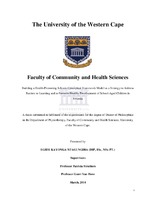Building a health-promoting schools conceptual framework model as a strategy to address barriers to learning and to promote healthy development of school-aged children
Abstract
After suffering almost total collapse. Rwanda has made impressive post-genocide progress. Many children of school going age are now attending school, but regrettably, only half complete primary school. High numbers of orphans, disabled children and a growing number of children from child-headed households still suffer the consequences of the poverty inherited from the past. Health problems include HIV/Aids, STIs, malaria, tuberculosis, enteric diseases, mental health problems, hunger and malnutrition. Use of drugs and substance abuse, unwanted pregnancies, lack of support services, unavailability of teaching and learning materials, inflexible curricula and poor teaching methodologies also contribute to learning breakdown. It is against this background that this thesis was conducted to investigate the development of a health-promoting schools model to provide an appropriate strategy to address barriers to learning and to promote healthy development of school children in Rwanda. Two research questions were the focus of this research, first, how does a health-promoting schools model provide an appropriate strategy to address barriers to learning and to promote healthy development of school-aged children in Rwanda and second, what are the participants’ views on and understanding of the model and its potential use in their schools? A mixed methods research design that employed both qualitative and quantitative approaches was used. The study followed sequential implementation: Phase 1 was concerned with the identification of the components for the model. It was a case study of four schools, two rural schools and two urban schools in Kigali City. The sample included 60 teachers, pupils, principals and parents from schools and nine key informants who were policymakers from the Ministries of Education and Health and Social Welfare, line institutions and the UNICEF. Data collection strategies included focus group discussions, semi-structured, in-depth individual interviews, a transect walk and observations. Data analysis was through content analysis. Eight themes emerged out of the data: school leadership and management; school health policies; pupil wellbeing; school partnership with parents, families and local communities; school health services; factors affecting teaching and learning for all children; teacher wellbeing; and a healthy physical school environment. These themes became the components that informed the development of a health-promoting schools model. In Phase 2, the degree of understanding of this proposed model and its components were investigated in each school community.

